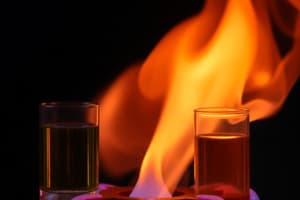Podcast
Questions and Answers
Which statement accurately describes the role of vaporization in the combustion of solid fuels?
Which statement accurately describes the role of vaporization in the combustion of solid fuels?
- Solid fuels must first decompose and vaporize into a gaseous state before combustion can occur. (correct)
- Vaporization cools the solid fuel, preventing rapid combustion and extending the burn time.
- Vaporization is not applicable to solid fuels; only liquids and gases require it for combustion.
- Solid fuels burn directly without undergoing any phase transition.
Why are liquid fuels typically vaporized before they combust?
Why are liquid fuels typically vaporized before they combust?
- Liquids do not burn; only the vapors produced from them are combustible. (correct)
- Liquids are directly combustible, and vaporization just makes it easier to control the rate of burn.
- Vaporization concentrates the fuel, making it easier to ignite.
- Vaporization decreases the fuel's temperature, preventing uncontrolled explosions.
What condition is essential for a gaseous vapor to ignite and potentially explode?
What condition is essential for a gaseous vapor to ignite and potentially explode?
- The vapor must diffuse and mix with air in appropriate proportions. (correct)
- The vapor must be completely isolated from air.
- The vapor must be compressed to high densities.
- The vapor must be cooled to a temperature below its flash point.
Which of the following best explains why fuel volatility is important for combustion?
Which of the following best explains why fuel volatility is important for combustion?
Consider a scenario where a solid fuel is heated but does not ignite. What process is likely occurring?
Consider a scenario where a solid fuel is heated but does not ignite. What process is likely occurring?
Flashcards
Fuel
Fuel
Any substance that will burn or support combustion.
Solid Fuel State
Solid Fuel State
Fuel decomposes with heat, vaporizes, and becomes a gas.
Liquid Fuel State
Liquid Fuel State
Fuel doesn't burn directly; vapors rise from the surface.
Gaseous Vapor Fuel State
Gaseous Vapor Fuel State
Signup and view all the flashcards
Vapor State
Vapor State
Signup and view all the flashcards
Study Notes
- Fuel is any substance that will burn or support combustion.
- The three basic states of fuel are solid, liquid, and gaseous vapor.
- Solid fuel decomposes with heat, vaporizes, and becomes a gas.
- Liquid fuel does not burn; vapors rise from its surface.
- Gaseous vapor may ignite or explode as it diffuses in the air.
- Fuel can only be volatile and consumed in the vapor state.
Studying That Suits You
Use AI to generate personalized quizzes and flashcards to suit your learning preferences.




